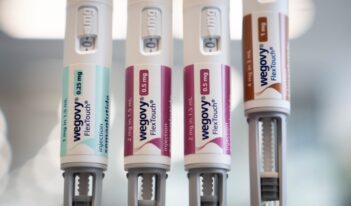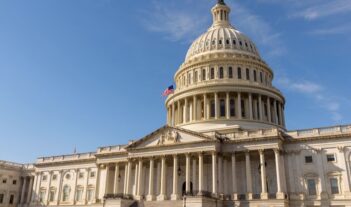
25 states sue to stop SNAP suspension, the Justice Department announces poll monitoring plan, and more…
IN THE NEWS
- A group of 25 states sued the U.S. Department of Agriculture (USDA) to compel the use of emergency funds appropriated by Congress to continue providing federal Supplemental Nutrition Assistance Program (SNAP) benefits during the government shutdown. The states argued in their filing that USDA is violating the Food and Nutrition Act—which established the SNAP program—and the Administrative Procedure Act by not using the contingency funds for SNAP. This lawsuit follows a USDA directive instructing state agencies to implement the suspension of SNAP beginning on November 1 until “sufficient federal funding is provided.” Such a suspension would mark the first in the history of the SNAP program.
- The U.S. Department of Justice announced that personnel from its Civil Rights Division will be monitoring polling locations in one New Jersey county and five California counties ahead of Election Day. The Justice Department stated that this effort would ensure transparent election processes, ballot security, and adherence to federal law. This announcement follows letters reportedly sent by the California and New Jersey Republican Parties to the Justice Department requesting the federal government’s assistance in monitoring elections. In response, California Governor Gavin Newsom stated in a video that “this was about voter suppression,” and California Attorney General Rob Bonta announced that the state will be sending its own observers to monitor federal personnel.
- U.S. Health and Human Services Secretary Robert F. Kennedy, Jr., stated on October 29, 2025, that there is “not sufficient” evidence linking Tylenol use during pregnancy to autism, softening earlier Trump Administration warnings. Kennedy advised pregnant women to use the drug only when “absolutely necessary,” despite medical consensus affirming its safety for fever and pain relief. Experts emphasized that studies show associations but no causation, with organizations like the American College of Obstetricians and Gynecologists confirming that Tylenol’s benefits outweigh unproven risks. Supporters praised the statement for addressing potential neurodevelopmental concerns, while critics warned that it promotes misinformation, potentially reducing safe medication access amid ongoing lawsuits against Tylenol makers.
- Texas Attorney General Ken Paxton filed a lawsuit against Tylenol following last month’s announcement by the U.S. Food and Drug Administration (FDA) of a potential link between the use of acetaminophen—the active ingredient in Tylenol—during pregnancy and autism in children. The lawsuit alleges that Kenvue and Johnson & Johnson knew that acetaminophen was dangerous to children but hid the danger and deceptively marketed Tylenol as “the only safe painkiller for pregnant women.”
- FDA launched a new priority review voucher program, expediting approvals for drugs addressing high-burden conditions such as obesity, potentially reducing review times to one to two months. Eli Lilly submitted its application for orforglipron, a GLP-1 pill showing 12.4 percent body weight loss in trials, under the program’s criteria for unmet medical needs and U.S. manufacturing expansion. Supporters praised FDA for accelerating innovation in obesity care, while critics warned of potential regulatory shortcuts risking safety and efficacy assessments.
- FDA also issued draft guidance to streamline the approval process for cheaper alternative versions of biologic drugs—drugs engineered with living cells, often used to treat chronic diseases. The new guidance allows manufacturers of these alternatives, called biosimilars, to use analytical testing instead of testing on humans to gain approval. FDA Commissioner Marty Makary stated that this effort could “achieve massive cost reductions for advanced treatments for cancer, autoimmune diseases, and rare disorders affecting millions of Americans.”
- Chairman of the Senate Judiciary Committee Chuck Grassley (R-Iowa) called for oversight of federal judges’ artificial intelligence (AI) use after two federal judges admitted their staff used AI to draft factually inaccurate court orders. Grassley called for every federal judge, the Administrative Office of the U.S. Courts, and the Judicial Conference of the United States to develop formal measures to prevent future AI misuse. On the Senate floor, Grassley said that “our federal courts must hold themselves to the highest of standards. Our Constitution depends on it. Justice requires it. Americans deserve better from their judges.”
- Congress has called on NBA Commissioner Adam Silver to brief the House Committee on Energy and Commerce following an illegal gambling and sports rigging scandal, which included current and former NBA players and coaches, resulted in two federal indictments last week. Besides questions about the NBA’s internal oversight of sports betting, Silver will be asked to explain potential gaps in existing federal regulations. In an interview last week, Silver said, “I wish there was federal legislation rather than state by state. I think you’ve got to monitor the amount of promotion, the amount of advertising around it.”
WHAT WE’RE READING THIS WEEK
- In a briefing paper from the Cato Institute, Chris Edwards, a policy scholar at the Cato Institute, examined the Supplemental Nutrition Assistance Program (SNAP), arguing that it fails to promote healthy diets despite soaring costs. Edwards noted that the program includes 42 million SNAP recipients who face higher obesity rates than low-income non-participants. He highlighted $145 billion in 2023 SNAP spending, including $12 billion in administrative costs and $58 billion in deadweight tax losses, plus $20 billion in potential fraud. Edwards recommended restricting purchases to nutritious foods, repealing benefit hikes, and phasing out federal SNAP in favor of state block grants to encourage efficiency and innovation. He concluded that reforms could save billions while addressing obesity, aligning aid with federal nutrition goals.
- In an essay in the Administrative Law Review, Cree Jones and Tyler B. Lindley, professors at the Brigham Young University Law School, and Thomas Smith, an associate at Keller & Heckman LLP, argued that the impact of presidential removal restrictions depends on whether an agency is partisan or not. The Jones team studied whether a judicial decision that rules removal restrictions at an agency are unlawful impacts the likelihood of early departure by appointed officials, focusing on a 2010 U.S. Supreme Court case. By comparing early departures from the Public Company Accounting Oversight Board to those in similar agencies in a 20-year time span, the Jones team found that it took nearly a decade for there to be a significant increase in early departures. The Jones team also found that, in a partisan environment, statutory removal restrictions serve as a buffer from political influence and, conversely, that forced removal of agency leaders effectively changed agency behavior.
- In a Brookings Institution article, Nellie Liang, a fellow in economic studies at Brookings, outlined key considerations for regulators implementing the GENIUS Act, which creates a framework for stablecoin issuers to operate in the United States. Liang emphasized that financial regulators need to write management requirements within 18 months to maintain stable value and establish conditions for nonfinancial stablecoin issuers—including major tech companies—to prevent excessive concentration of economic power. Liang further urged financial regulators to implement strong regulations for foreign stablecoin issuers to reduce arbitrage incentives and ensure issuers have technological capacity to counter illicit finance.
EDITOR’S CHOICE
- In an essay in The Regulatory Review, Leo Tzu-Chiang Huang, a human rights scholar at the University of Pennsylvania Carey Law School, examined the liability shield for online platforms under Section 230 of the Communications Decency Act. Huang observed that the provision, intended to foster free speech, enables platforms to profit from harmful content like hate speech and misinformation without accountability. He proposed replacing blanket immunity with a conditional safe harbor requiring due diligence to protect human rights, as well as transparent moderation policies. Huang concluded that aligning platform regulation with international human rights standards could balance innovation and public safety, urging Congress to reform outdated protections.



